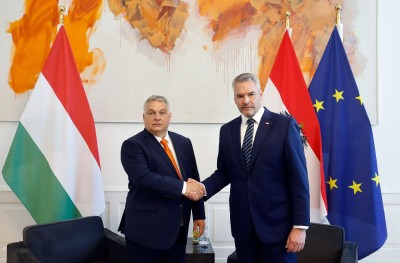Viktor Orbán Meets Austrian Chancellor for Controversial Talks in Vienna
Viktor Orban, the polarising Prime Minister of Hungary, met with Austrian Chancellor Karl Nehammer last week in Vienna. The two statesmen expressed friendship, but also disagreed on some issues.
 Prime Minister of Hungary, Viktor Orban and the Austrian Federal Chancellor Karl Nehammer. / Picture: © Bundeskanzleramt (BKA) / Dragan Tatic
Prime Minister of Hungary, Viktor Orban and the Austrian Federal Chancellor Karl Nehammer. / Picture: © Bundeskanzleramt (BKA) / Dragan Tatic
Last week, the polarising Prime Minister of Hungary, Viktor Orban, met with the Austrian Chancellor Karl Nehammer in Vienna. The meeting was marked on the one hand by declarations of common friendship, but also by differences between the two statesmen.
It was a meeting that was ill-omened from the outset. The already delicate encounter with the controversial Hungarian prime minister was made even more difficult by a scandal on Orban's part. The Hungarian politician was heavily criticised in the media last week for alleged racist remarks and an inappropriate joke alluding to mass murder in German concentration camps.
Following this, Christoph Heubner, Vice President of the International Ausschwitz Committee, called on Karl Nehammer to confront Orban and built pressure on the Austrian Chancellor.
However, no apology was forthcoming for the words spoken. Orban stressed that he fully agreed with Nehammer's convictions "on the issues of anti-Semitism and racism". He went even further, stressing that Hungary was proud of its achievements in the fight against racism and that Hungary was a leader on these issues.
Unity on migration
One of the most important topics of the meeting was illegal migration in both countries. Here, both were of the same opinion and assured each other to pull together in the future.
"Therefore, regardless of the fact that I may have a different philosophical view on immigration and migration than your chancellor, we are in agreement on the concrete measures to be taken, considering the fact that it is also in Austria's interest that Hungary protects its southern borders," Viktor Orban said in a statement after the meeting in Vienna.
The already functioning police cooperation with Hungary was not enough: Serbia was needed as a geostrategic partner, which was called upon to protect its southern border. For this reason, Austria had agreed to Orban's proposal of a joint conference with Serbia to put a stop to "irregular migration".
Hungarian scepticism about Ukraine strategy
The war in Ukraine was also an important topic of discussion. Orban stressed that, in his view, the war could not be won in the form it has been fought so far. In Hungary's view, the concept of NATO supporting Ukraine with weapons and training officers while the Ukrainians fight the Russians is a construct that has already proven to be impossible for Ukraine to win. Without a change of strategy, Orban sees no chance for the long-awaited peace.
For his part, Orban also criticised the EU's sanctions strategy against Russia as a means to end the Ukraine war, also warning of a future war economy and recession. Mandatory rationing of natural gas "is the first sign of a war economy", Orban said. He feared an economic situation marked by war, in which the entire EU could slide into an unstoppable recession.
Harmonious economic relationship
Both interlocutors were convinced of the harmony in the economic relations between the two countries. With 2,000 companies, Austria is the second largest investment community in Hungary. Hungary is grateful for Austrian investors and will continue to work on attracting them in the future, Prime Minister Orban assured.
Cabinet Office of the Hungarian Prime Minister
Federal Chancellery of Austria



